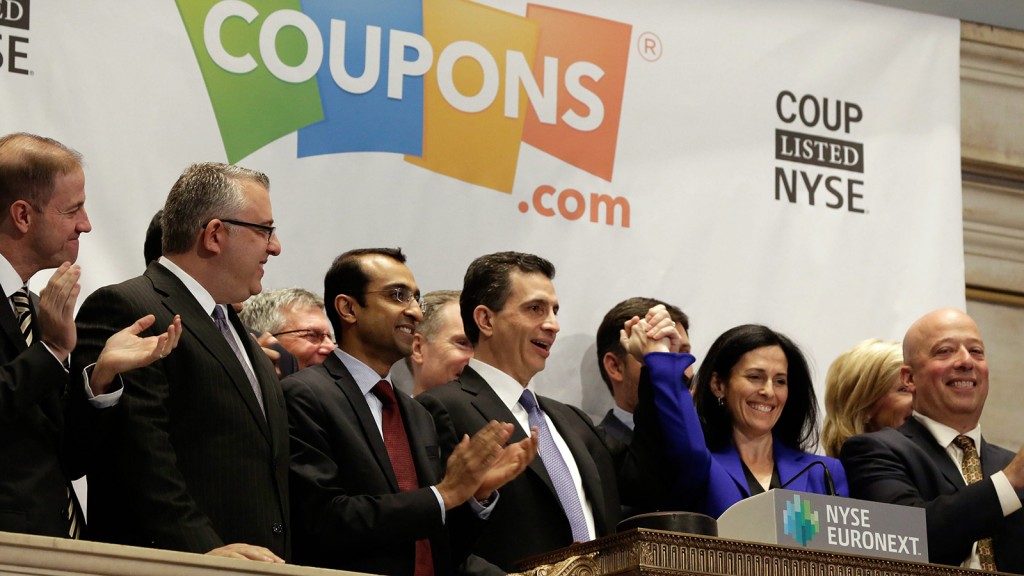The incredible shrinking stock market
Despite an abundance of IPOs, the market isn’t that strong
Share

As any investment banker worth his suspenders will tell you, two things are necessary for a booming IPO market: growing companies with compelling stories to tell (even if those tales might sometimes buckle under scrutiny), and frothing masses of investors desperate for a piece of the action. At first blush, both abound these days. But look past the Street’s hype machine, and something is seriously wrong with the stock market.
Usually, an abundance of IPOs is taken as a sign of a strong market, and there’s no shortage in the hopper. Already this year, 52 companies have gone public in the U.S., raising nearly US$10 billion. That’s a faster start than last year, which, with 214 IPOs, was the busiest for new listings since the dot-com bubble. In late March, Everyday Health Inc., a provider of “digital health and wellness solutions”—in other words, advice websites offering such gems as “9 gross things lurking in your child’s lunchbox” (spoiler alert: sheep sweat is one)—was set to raise US$123 million on the New York Stock Exchange. Or how about GrubHub, a service for placing pickup and delivery orders at restaurants, which, if its IPO is successful, would be worth US$1.7 billion. Coupons.com, a supplier of digital coupons, saw its stock price nearly double the day its shares went public in early March, while Airbnb, an online home-rental marketplace, is gearing up for an IPO that could value it at US$10 billion. Though much smaller in scale, Canada’s IPO market is also seen to be picking up. Many expect Vancouver’s Hootsuite, the social media management company, to go public, alongside other tech firms such as Ottawa’s Shopify, a platform for online retailing, and Vision Critical, a market research firm in Vancouver.
The companies—and, in particular, the investment bankers knocking down their doors to do the deals—are hoping to cash in on the bull market that’s been running, more or less non-stop, since March 2009. With recession-scarred households slowly realizing the stock market has left them behind, some mom-and-pop investors are tiptoeing back in. And, psst, do the bankers ever have an IPO opportunity for them.
But none of this is likely to reverse a terminal affliction facing capital markets. Put bluntly, the stock market is shrinking. Amid the IPO hype, and with market prices reaching new highs, it’s easy to forget that the number of domestic companies trading on U.S. exchanges has been in free fall. Since peaking at 8,800 in 1997, the number dropped to little more than 4,100 in 2012, according to World Bank figures. A couple of hundred IPOs a year won’t reverse that, especially since so many other companies regularly get gobbled up through takeovers or simply fail.
At the same time, the number of shares regularly changing hands—the very trades catapulting stock prices to new highs—has grown uncomfortably thin. Average daily trading volume in the S&P 500 stock index is half of what it was a decade ago, and about the same as in 1998. Lighter volumes can exacerbate market volatility. Low volumes also suggest that, while some households may be warming to stocks, most aren’t.
Canada’s stock market offering is marginally better. There hasn’t been a big drop in the number of listings, thanks to the flood of resource companies that went public over the past decade. But the number of listings has barely budged since 2002. And for each new company coming to market, it seems another gets taken out. In comes Hootsuite, out goes Montreal’s toy giant Mega Brands, just bought by Mattel. In comes Catalyst Capital, which offers financing to risky companies banks won’t touch. Out goes Vancouver’s Coastal Contacts, the online eyeglass retailer snapped up by France’s Essilor.
Then consider this. Of the 3,650 listed issuers in Canada, 60 per cent trade on the TSX Venture Exchange, the junior market where upstart companies are meant to prove their stuff before graduating to the Big Board. Of those venture listings, more than 70 per cent now trade below 10 cents. Thin gruel, indeed. And outside of those few tech companies looking to debut in Canada, most new listings on the TSX could best be described as Frankenstocks—financially engineered products, like exchange traded funds, that are zapped to life on Bay Street boardroom tables.
There’s real reason to be concerned about these trends. A broad and vibrant capital market has always been crucial to the health of free market economies. It should enable companies to raise capital to fund new ventures and invest in growth, leading to increased hiring and better incomes for workers. That virtuous cycle is broken.
Wall Street and Bay Street have not done themselves any favours. Repeated scandals and frauds have shattered public trust in the markets—a link that, once broken, may take a generation to fix. At the same time, regulators have countered with ever more onerous sets of rules that drive up the cost and complexity of being a public company and have deterred entrepreneurs from going that route.
Add it all up, and it’s a mess no giddy IPO boom can put right.